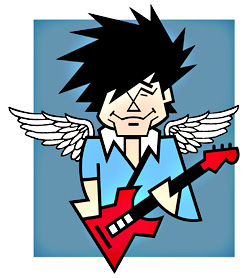Imagine, if you will, that Ryan Adams had left this mortal coil seven years ago, shortly after the release of his critically exalted solo debut, Heartbreaker. He would have been in his late 20s, the hazardous age for troubled, talented rock stars. And it’s a safe bet he would now be canonized as a brilliant shooting star, shot from view far too soon. What little work he had done would be fetishized: one utterly perfect solo effort, and a trio of genre-defining records with his rough-and-tumble alt-country band Whiskeytown.
But Adams didn’t die. He dove into music with all the messy ambition, headline-grabbing bravado, and unfiltered ethics of an artist who values quantity over quality. Genre-surfing with a mix of reckless petulance and impressive adventurousness that reflected his southern Americana roots and youthful punk proclivities, he traversed through modern rock, classic country, shimmering pop, and even one ridiculous stop in hip-hop territory (thankfully, as a Web-only posting). He made his semisuccessful bid for superstardom with 2001’s Gold, and then went on to produce a series of wildly uneven releases, from the slick, self-conscious tone of 2003’s Rock N Roll to 2005’s rudderless 29 (the third in Adams’ overly ambitious trio of 2005 recordings). Though his gifts for insightful lyricism and sharply crafted musicianship still occasionally revealed themselves, the inconsistency of his output began shifting his status from “next big thing” to “train wreck in progress.”
Adams’ childish antics didn’t help matters: embarrassing incidents including crank calls to critics and myopic onstage meltdowns, and a predictable trail of substance-abuse admissions following in their wake. Though it’s unfair and inaccurate to dismiss all of Adams’ post-Heartbreaker work, there’s been a legion of fans waiting for him to pull it together and deliver a record that possesses the charms and timeless qualities of that debut.
Astonishingly, just when many (this writer included) were ready to surrender that fantasy, Adams delivers Easy Tiger, an unexpected redemption reminiscent of the romantic, slice-of-life sketches that lent Heartbreaker a sense of winsome humility, but with a smooth finish that could reignite his chances of mainstream success. From the triumphant opening of “Goodnight Rose,” a reassuring mission statement to a lover that the future is bright, to the closing tremble of “I Taught Myself How to Grow Old,” a vulnerable rumination on self-reliance and spiritual endurance, Easy Tiger is both a return to the honest, solid songwriting that his grassroots fans embraced and a push forward for an artist who had seemingly lost his footing.
Not that he’s admitting to a single misstep. “I never had that much ego to begin with. I was just terrified and, therefore, put on a brave face to get through rough times,” Adams says in a recent phone call from the road. He also seems to feel that all the analysis of his debauchery and reported newfound sobriety isn’t worth the energy. “I was never an actual alcoholic drug addict that didn’t completely function and bust my ass.” Though industry insiders continue to speculate about whether Adams is actually the rehabbed rocker portrayed in a recent New York Times profile or simply a wanton wild child temporarily reeling it in for P.R. reasons, reviews of his recent live shows indicate Adams is more intent on delivering impressive performances than, say, arguing with an audience member who confuses him with a certain ’80s rock star.
“The best thing to do when you’re scared is to act like a dick,” he continues. “I felt like every year for me was my freshman year in the music business. If I wasn’t able to be tough and act like I belonged, I would have been pushed out. I may have said or done things that seemed outrageous, but I’ve probably also done things other musicians wish they had done.”
What he has inarguably done is remained committed to his craft, and there is something admirable in his dogged determination to challenge himself. Perhaps all those creative detours are part of the journey that someone with his inexhaustible drive has to take. “I think I’ve been nothing but true to myself this entire time—I don’t have any regrets,” Adams says. “At every moment, I felt like a decision I was making would be looked at as ridiculous or difficult, or I was being an asshole or whatever. It’s all led me to where I’m at. At least when I can’t sleep, it’s not about what I do for a living. It’s not about my art—that I’m at peace with.”








